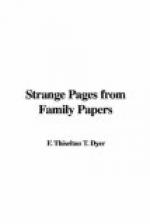Likewise, the peasantry still talk mysteriously of Lord Derwentwater’s execution, and tell how his blood could not be washed away. Deep and lasting were the horror and grief which were felt when the news of his death reached his home in the north. The inhabitants of the neighbourhood, it is said, saw the coming vengeance of heaven in the Aurora Borealis which appeared in unwonted brilliancy on the evening of the execution, and which is still known as “Lord Derwentwater’s Light” in the northern counties; the rushing Devil’s Water, too, they said, ran down with blood on that terrible night, and the very corn which was ground on that day came tinged from the mill with crimson. Lord Derwentwater’s death, too, was all the more deplored on account of his having long been undecided as to whether he should embrace the enterprise against the House of Hanover. But there had long been a tradition in his family that a mysterious and unearthly visitant appeared to the head of the house in critical emergencies, either to warn of danger, or to announce impending calamity. One evening, a few days before he resolved to cast in his lot with the Stuarts, whilst he was wandering amid the solitudes of the hills, a figure stood before him in robe and hood of grey.
This personage is said to have sadly reproached the Earl for not having already joined the rising, and to have presented him with a crucifix which was to render him secure against bullet or sword thrust. After communicating this message the figure vanished, leaving the Earl in a state of bewilderment. The mysterious apparition is reported to have spoken with the voice of a woman, and as it is known that “in the more critical conjunctures of the history of the Stuarts every device was practised by secret agents to gain the support of a wavering follower,” it is not difficult to guess at a probable explanation of the ghost of the Dilston Groves. It may be added that at Dilston, Lady Derwentwater was long said to revisit the pale glimpses of the moon to expiate the restless ambition which impelled her to drive Lord Derwentwater to the scaffold.
But how diverse have been the causes of many of these romantic blood stains may be gathered from another legendary tale connected with Plaish Hall, near Cardington, Shropshire. The report goes that a party of clergymen met together one night at Plaish Hall to play cards. In order that the real object of their gathering might not be known to any but themselves, the doors were locked. Before very long, however, they flew open without any apparent cause. Again they were locked, but presently they burst open a second time, and even a third. Astonished at what seemed to baffle explanation, and whilst mutually wondering what it could mean, a panic was suddenly created when, in their midst, there appeared a mysterious figure resembling the Evil One. In a moment the invited guests all rose and fled, leaving the unfortunate host by himself “face to face with the enemy.”




